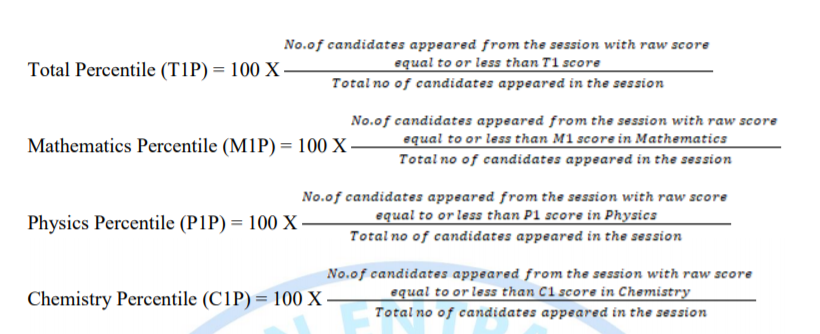Amity University-Noida B.Tech Admissions 2026
Among top 100 Universities Globally in the Times Higher Education (THE) Interdisciplinary Science Rankings 2026
What is a good score in JEE Main 2026: Candidates can check the good score in JEE Main 2026 on this page. A score of 250 or higher is considered as a good score. Based on previous year normalization patterns, 100 marks in JEE Mains percentile 2026 is expected to correspond to a percentile between 95-97, with a rank is 704 being sufficient to secure a seat in NITs or IITs through this exam. Candidates attempting the exam must be aware of the JEE Main good score 2026 to help plan their preparation for admission. A good score in JEE Main 2026 is essential for successful entrance to top colleges. A JEE Main score above 250+ is regarded as a good score. The JEE Main exam will be conducted in online mode. The JEE Main 2026 exam is being conducted on January 21 to 29, 2026, while session 2 exam is scheduled for April 2 to 9, 2026.
Also Read: JEE Main rank predictor
The final answer key, along with the JEE Main result 2026 link, will be activated at jeemain.nta.nic.in.
This Story also Contains

Now, the question arises: how to achieve such good marks in JEE Main? So to help candidates with this confusion Careers360 has given a detailed analysis of good marks in JEE Main and the preparation strategy for how to get good marks in JEE Main.
Aspirants can check the good rank in JEE Mains from the table given below. The rank of JEE Main is based on the scores of students in the entrance exam. A good rank in JEE Main depends on the number of students who appeared for the exam, difficulty level of the exam, cutoff marks, etc.
Category | JEE Ranks |
|---|---|
Excellent | 1-15,000 |
Good | 15,000-30,000 |
Average | 30,000-50,000 |
Low | Above 50,000 |
| Rank Type | Rank Range |
|---|---|
| Good | Upto 25000 |
| Average | 50000 |
| Above average | 25000 to 50000 |
Related: JEE Main accepting colleges
Based on the scores secured by the candidates in the IIT JEE exam can check the JEE Main marks vs percentile vs rank from the table given below. Knowing the marks vs percentile vs rank of JEE Main will help the candidates plan how to score good marks in JEE Mains. NTA adopts a unique normalization formula to arrive at JEE Main Marks Vs Percentile Vs Rank. Here we have given the expected marks vs percentile of JEE Main.
| JEE Main Marks | JEE Main Percentile | JEE Main Rank |
|---|---|---|
| 300-291 | 100-99.999 | 1 - 15 |
| 292-280 | 99.99890732 - 99.99617561 | 16 - 56 |
| 279-271 | 99.99417236 - 99.99153171 | 86 - 125 |
| 268-259 | 99.99034797 - 99.97687156 | 142 - 341 |
| 258-250 | 99.97413985 - 99.95228621 | 381 - 704 |
| 249-240 | 99.95028296 - 99.91549924 | 733 - 1246 |
| 239-230 | 99.91395128 - 99.87060821 | 1269 - 1909 |
| 229-220 | 99.86150253 - 99.78191884 | 2043 - 3217 |
| 219-210 | 99.77499852 - 99.69159044 | 3319 - 4549 |
| 209- 200 | 99.68494329 - 99.57503767 | 4647 - 6269 |
| 199-190 | 99.56019541 - 99.40858575 | 6488 - 8724 |
| 189- 180 | 99.39319714 - 99.17311273 | 8951 - 12197 |
| 179-170 | 99.1567225 - 98.87981861 | 12439 - 16524 |
| 169-160 | 98.85149993 - 98.52824811 | 16942 - 21710 |
| 159-150 | 98.49801724 -98.09290531 | 22156 - 28132 |
| 149-140 | 98.07460288 - 97.54301298 | 28402 - 36243 |
| 139-130 | 97.4927496 - 96.87838902 | 36985 - 46047 |
| 129-120 | 96.80927687 - 96.0687115 | 47066 - 57991 |
| 119-110 | 95.983027 - 95.05625037 | 59254 - 72925 |
| 109-100 | 94.96737888 - 93.8020333 | 74236 - 91426 |
| 99-90 | 93.67910655 - 92.21882783 | 93240 - 114780 |
| 89-80 | 92.05811248 - 90.27631202 | 117151 - 143434 |
| 79-70 | 90.0448455 - 87.51810893 | 1468491 - 184121 |
| 69-60 | 87.33654157 - 83.89085926 | 186799- 237626 |
| 59-50 | 83.5119717 - 78.35114254 | 243215 - 319343 |
| 49-40 | 77.81927947 - 69.5797271 | 327188 - 448730 |
| 39-30 | 68.80219265 - 56.09102043 | 460200 - 647703 |
| 29-20 | 54.01037138 - 36.58463962 | 678394 935442 |
| 19-10 | 35.2885364 - 18.16647924 | 954561 - 1207129 |
| 9-0 | 17.14582299 -5.71472799 | 1222184 - 1390805 |
Among top 100 Universities Globally in the Times Higher Education (THE) Interdisciplinary Science Rankings 2026
Last Date to Apply: 25th Feb | Ranked #43 among Engineering colleges in India by NIRF | Highest Package 1.3 CR , 100% Placements
The minimum rank required by the candidates to get admission in their desired institute is JEE Main cutoff 2026. While this year’s cutoff will be released after the exam, candidates can check the cutoff trends to understand what is a good score in JEE Mains. Generally, a higher the rank higher the chances of admission.
| Category | 2025 | 2024 | 2023 | 2022 | 2021 | 2020 | 2019 |
|---|---|---|---|---|---|---|---|
General | 93.0123262 | 93.2362181 | 90.7788642 | 88.4121383 | 87.8992241 | 90.3765335 | 89.7548849 |
Gen-PwD | 0.0079349 | 81.3266412 | 0.0013527 | 0.0031029 | 0.0096375 | 0.0618524 | 0.11371730 |
EWS | 80.3830119 | 79.6757881 | 75.6229025 | 63.1114141 | 66.2214845 | 70.2435518 | 78.2174869 |
OBC-NCL | 79.4313582 | 60.0923182 | 73.6114227 | 67.0090297 | 68.0234447 | 72.8887969 | 74.3166557 |
SC | 61.1526933 | 46.6975840 | 51.9776027 | 43.0820954 | 46.8825338 | 50.1760245 | 54.0128155 |
ST | 47.9026465 | 0.0018700 | 37.2348772 | 26.7771328 | 34.6728999 | 39.0696101 | 44.3345172 |
National Testing Agency, NTA uses the normalization process of JEE Main to calculate the score of JEE Mains. The JEE Main percentile score ranges from 0-100. Below is the formula to calculate the percentile score using the JEE Main normalization process.
JEE Main Normalized score formula: (100 x number of candidates who appeared in the session with a raw score equal to or less than the candidate) / total number of candidates who appeared in that session

After knowing what is a good score in JEE Main, now candidates should know what preparation strategy to opt for scoring good marks. To score good marks in JEE Mains candidates need to follow a full proof preparation strategy. So here we have provided the preparation tips for scoring good marks in JEE Main.
Frequently Asked Questions (FAQs)
As per the previous year trends, 250+ is considered a good score for JEE Main exam.
Candidates having marks above 89 but less than 94 will obtain the 92 percentile.
In order to score 150 marks in JEE Main exam candidates need to follow proper preparation strategy. Solve as many mock tests as possible and check the exam pattern to get the vibe of actual exam.
The percentile score will be 70 if the candidate secures 60 marks in JEE Main.
The percentile score will range from 84 to 91 if the candidate secures 70 marks in JEE Main.
A score of 260 in JEE Mains is considered excellent. It corresponds to around the 99th percentile, indicating a high level of performance. This score significantly increases the chances of gaining admission to top engineering colleges in India.
Analysts predict that to qualify for JEE Mains 2026, candidates will need to achieve a minimum of 95 percentile, which is expected to correspond to a score between 170 to 180 marks.
For JEE Main 2026, a safe score is expected to be between 175 and 185 marks, which corresponds to approximately the 95th percentile. This range can improve the chances of qualifying and securing admission to reputed engineering colleges.
On Question asked by student community
Arnav Gautam & P.Mohith secured 300 out of 300 in JEE Mains session 1, as per the provisional answer key. The list of toppers to be released with JEE Main results
JEE Main 2026 session 1 result is not declared yet. JEE Main session 1 result will be declared on February 12.
A rank above 50,000 is considered good in JEE Mains. Some of the private colleges accepting JEE Mains are
The 69-77 marks in JEE Main examination are considered to be the average score and does not guarantee best branches in top tier NITs and IIITs. Some of the branches in which students with this much score can get admission are Electronics and Communication Engineering, Computer Science and Engineering, and
With a rank between 50,000 and 65,000 in JEE Main, you can get admission in some of the NITs, private and government colleges. Here is the list of some of the colleges.
Among top 100 Universities Globally in the Times Higher Education (THE) Interdisciplinary Science Rankings 2026
Recognized as Institute of Eminence by Govt. of India | NAAC ‘A++’ Grade | Upto 75% Scholarships | Application Deadline: 15th Jan
UG Admissions Open 2026 | Highest CTC 52 LPA | Average CTC 9.09 LPA | 60+ Collaborations with the world's best Universities
Institute of Eminence (IOE) by Govt. of India | Merit Based Scholarships | Ranked #11 by NIRF | Last Date to Apply: 16th Mar'26
India's youngest NAAC A++ accredited University | NIRF rank band 151-200 | 2200 Recruiters | 45.98 Lakhs Highest Package
Highest CTC 44.14 LPA | UGC Approved | 1600+ Recruiters | 100% Placement